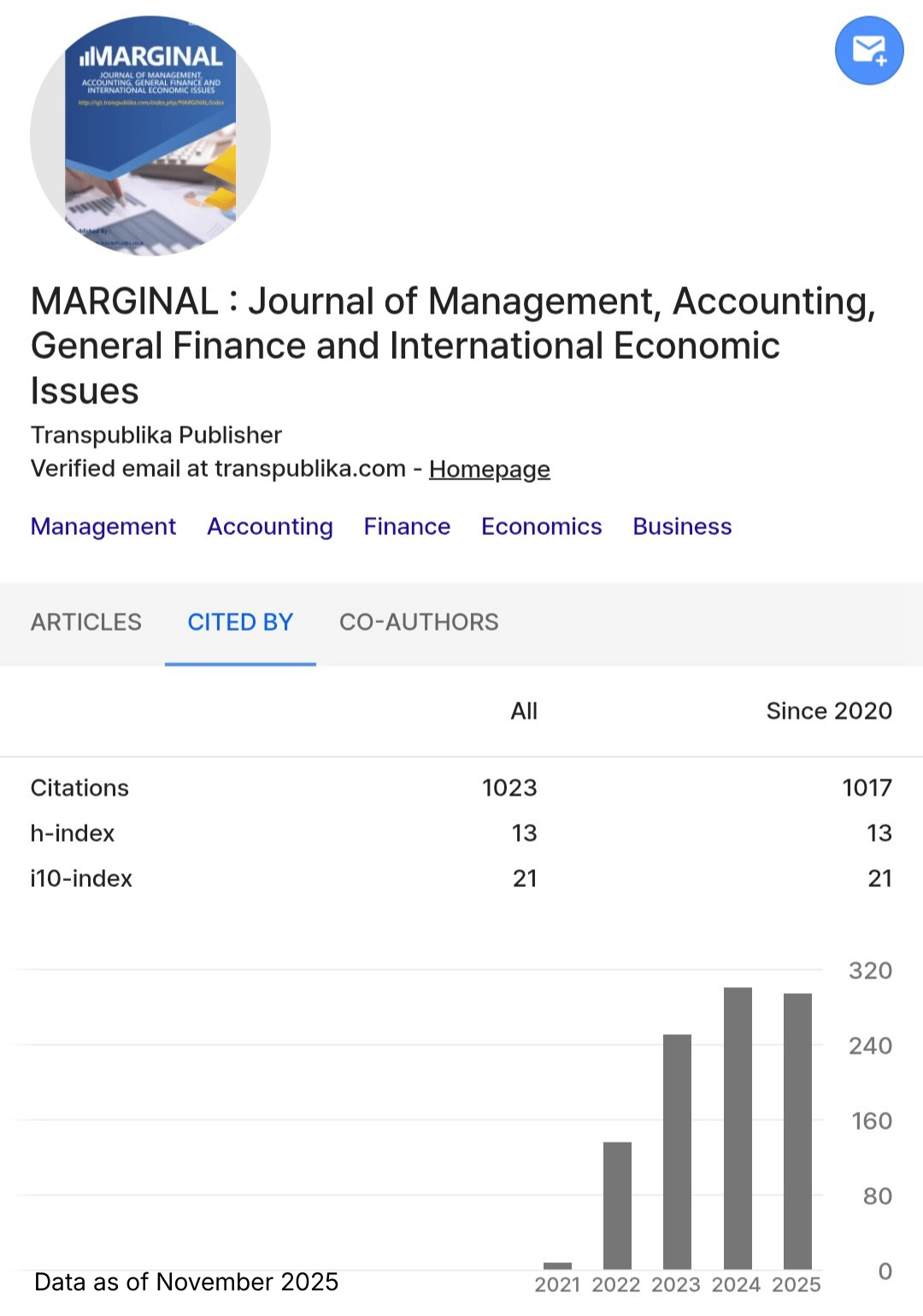THE INFLUENCE OF MANAGERIAL LEADERSHIP AND NEW PUBLIC MANAGEMENT ON COMMUNITY WELFARE IN KAIMANA REGENCY MEDIATED BY GOOD GOVERNANCE AND LOCAL GOVERNMENT PERFORMANCE
Main Article Content
Matias Mairuma*
Balthasar Kambuaya
Ruben Tuhumena
Anita Erari
This study discusses The Influence of Managerial Leadership and New Public Management on Community Welfare in Kaimana Regency Mediated by Good Governance and Local Government Performance. The approach used with two research designs (mixed method), namely: explanatory (quantitative method) and exploratory (qualitative method). The research sample consisted of 241 people. The quantitative data analysis method uses Structural Equation Modeling (SEM) with the help of the Amos program version 24.0 and qualitative analysis uses interactive models. The research results show that: (1) Managerial leadership has a positive and significant effect on good governance. (2) Managerial leadership directly and indirectly through good governance has a positive and significant effect on government performance. (3) Managerial leadership directly and indirectly through government performance has a positive and significant effect on people's welfare, while through good governance it is not significant. (4) New public management has a positive and significant effect on good governance. (5) New public management directly and indirectly through good governance has a positive and significant effect on government performance. (6) New public management directly has a positive and insignificant effect on people's welfare, while indirectly through good governance and government performance it has a positive and significant effect. (7) Good governance has a positive and significant effect on government performance. (8) Good governance directly has a positive and insignificant effect on community welfare, while indirectly through government performance it has a positive and significant effect. (9) Government performance has a positive and significant effect on community welfare.
Adebakin, O. I., & Gbadamusi, E. A. (1996). The practices of organizational leadership. Ibadan: Adeogun printing press.
Amalia, K. F. (2022). Pengaruh Akuntabilitas, Partisipasi Masyarakat, Kepemimpinan, Transparansi ADD, dan Kebijakan Desa Terhadap Kesejahteraan Masyarakat (Studi Kasus Pada Desa di Kecamatan Muncar Kabupaten Banyuwangi).
Andrisani, P. J., Hakim, S., & Savas, E. S. (2002). The new public management: Lessons from innovating governors and mayors. Springer Science & Business Media.
Barzelay, M. (2001). The new public management: Improving research and policy dialogue. University of California Press.
Bastian, I. (2006). Akuntansi sektor publik: Suatu pengantar.
Bovaird, T., Löffler, E., & Loeffler, E. (2003). Public management and governance (Vol. 3). Routledge London.
Boyle, R. (2000). Performance measurement in local government.
Chabib Soleh, S. (2011). Menilai Kinerja Pemerintah Daerah. Bandung: Fokusmedia.
Creswell, J. W. (2015). Educational research: Planning, conducting, and evaluating quantitative and qualitative research. pearson.
Ferlie, E. (1996). The new public management in action. Oxford University Press, USA.
Firdaus, R. (2024). Compensation, Leadership, and Work Discipline: Influences on Employee Performance. Academia Open, 9(2), 10–21070.
Hambrick, D. C., & Mason, P. A. (1984). Upper echelons: The organization as a reflection of its top managers. Academy of Management Review, 9(2), 193–206.
Hartati, S. (2020). Penerapan Model New Public Management (NPM) Dalam Reformasi Birokrasi Di Indonesia. Jurnal MSDA (Manajemen Sumber Daya Aparatur), 8(2), 65–84.
Haynes, M. E. (1984). Managing performance: A comprehensive guide to effective supervision. (No Title).
Hiller, N., Novelli, S. Ö., & Ponnapalli, A. R. (2016). Leadership competency builder.
House, R. J. (1996). Path-goal theory of leadership: Lessons, legacy, and a reformulated theory. The Leadership Quarterly, 7(3), 323–352.
James, G. L., Ivanecevich, J. M., & Donnely Jr, J. H. (1997). Organisasi; Perilaku, Struktur, Proses. Jakarta: Bina Aksara.
Kanyangale, M., & Pearse, N. (2014). Developing leadership competencies: Insights from emergent junior talent-intransitions in South Africa. International Journal of Organizational Leadership, 3, 56–79.
Kaufmann, D., Kraay, A., & Mastruzzi, M. (2003). Governance Matters: Governance indicators for 1996-2002. III. (Vol. 3106). World Bank.
Lynn Jr, L. E., Heinrich, C. J., & Hill, C. J. (2000). Studying governance and public management: Challenges and prospects. Journal of Public Administration Research and Theory, 10(2), 233–262.
Mangkunegara. (2013). Manajemen Sumber Daya Manusia Perusahaan. PT. Remaja Rosda Karya.
Mardiasmo, M. B. A. (2016). Perpajakan–Edisi Terbaru. Penerbit Andi.
Nanus, B. (1985). Leaders: The strategies for taking charge. New York: Harper & Row.
Noer, I. A. (2014). Pengaruh karakteristik kepala daerah terhadap kinerja keuangan pemerintah daerah (Studi pada Pemerintah Daerah di Pulau Jawa).
Olowu, D., & Sako, S. (2002). Better governance and public policy: capacity building for democratic renewal in Africa. Kumarian Press.
Patmasari, E. (2022). Multiplier Effect of Dam Development in Indonesia (A Study on Dam Development during the Leadership of President Joko Widodo). Research and Analysis Journal, 5(9), 17–23.
Patmasari, E. (2024). Analysis Of Infrastructure Development Policies In Botto Benteng Village, Majauleng District, Wajo Regency. Journal Of Humanities And Social Studies, 2(03), 1125–1132.
Pollitt, C. (1990). Managerialism and the Public Services: The Anglo-American Experience. Basil Blackwell.
Prawirosentono, S. (1999). Manajemen sumberdaya manusia: kebijakan kinerja karyawan: kiat membangun organisasi kompetitif menjelang perdagangan bebas dunia. Badan Penerbit Fakultas Ekonomi (BPFE).
Priansa, D. J. (2018). Manajemen Organisasi Publik (Mengembangkan Organisasi Modern Berorientasi Publik). Bandung: CV Pustaka Setia.
Rafiq, A. (2018). Reformasi Birokrasi. Malang: Media Nusa Creative.
Rahman, A. (2017). Konsep Murabbi dalam Al-Qur’an. Universitas Islam Negeri Sumatera Utara.
Sodiq, A. (2015). Konsep kesejahteraan dalam islam. Equilibrium, 3(2), 380–405.
Soekanto, S. (2006). Pengantar penelitian hukum. Penerbit Universitas Indonesia (UI-Press).
Stephen, R. P. (1996). Perilaku Organisasi. Konsep, Kontrovers don Aplikasi. Prenhalindo, Jakarta, 282, 289–301.
Sugiono, S. (2013). Metode Penelitian Kuantitatif Kualitatif Dan R&D. Bandung : Alfabeta.
Sutaryo, S. (2013). Karakteristik Eksekutif dan Kinerja Keuangan Pemerintah Daerah (Sebuah Telaah Teoritis dan Empiris). Fakultas Ekonomi Dan Bisnis. Staff UNS.
Wardhani, P. A., & Riharjo, I. B. (2015). Pengaruh Penerapan Konsep New Public Management Terhadap Peningkatan Kinerja Organisasi. Jurnal Ilmu Dan Riset Akuntansi (JIRA), 4(7).
Yukl, G. (1982). Managerial Leadership and the Effective Principal.




















